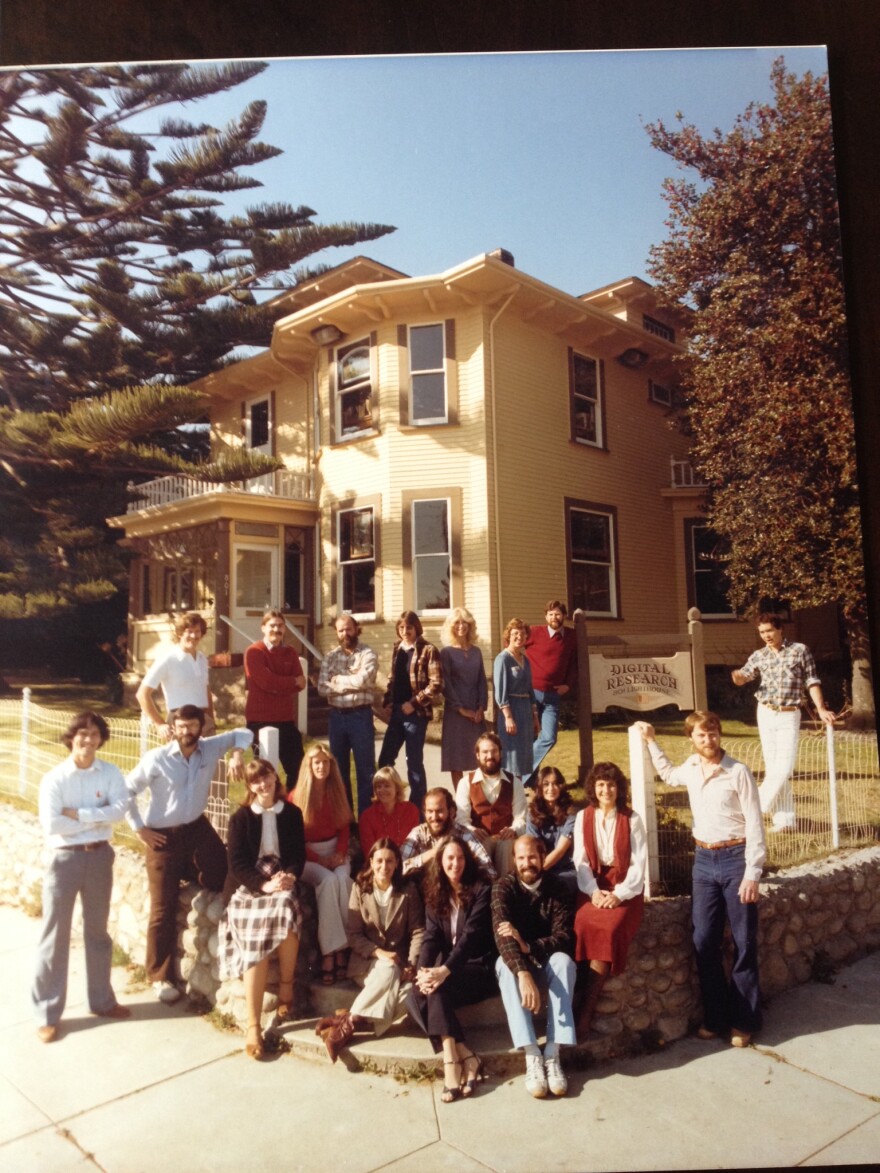This Friday Pacific Grove inventor Gary Kildall will formally take his spot in computer Science history. The Institute of Electrical and Electronics Engineers (IEEE) will recognize Kildall as the inventor of the first personal computer operating system by placing a plaque at the former headquarters of his company.
Kildall, who passed away in 1994, has often been referred to as “the man who could have been Bill Gates”, if not for one missed opportunity. But those who knew him best hope Friday’s dedication will begin to change that legacy.
Tom Rolander picks up a large picture from his dining room table at his home in Pacific Grove. It’s of an old Victorian on Lighthouse Avenue with a group of people posing out front near a carved wooden sign that reads Digital Research. “This was a wonderful time, we had so much fun in that building,” said Rolander.
In the picture Rolander and his future wife Lori sit on the steps along with other early employees of Digital Research. The company’s founder, Gary Kildall stands off to the side.
Kildall was a former Naval Postgraduate School Professor, Rolander’s college friend, best man in his wedding, mentor, business partner and the inventor of the first personal computer operating system called Control Program for Microcomputers or CPM.
“So at that point CPM was a very popular operating system. I don’t remember the exact number of computers that we were on, but we did have the major operating system that could run on microcomputers,” said Rolander, referring to the picture.
CPM did something we all take for granted now. It made it possible for users to run any application on any computer.
“In the past if you bought a Burroughs computer, you were obliged to use a Burroughs operating system and use their equipment. If you bought an IBM computer, you were obliged to buy all the IBM equipment,” said David Laws, Semi-Conductor Curator at the Computer History Museum. He’s a resident of Pacific Grove and recommended Kildall for the IEEE milestone.
Laws says Kildall’s invention blew open the doors for the software industry in Silicon Valley by making it possible for developers to write software once rather than several times for ever different computer out there.
“Everything would be much more expensive because you couldn’t get the economies of scale of writing a program for one vendor and having it work with everybody’s machine, so it would be much more fragmented, much smaller, much more expensive,” said Laws.
But for decades, Gary Kildall’s contribution to the development of the personal computer has been overshadowed by one business decision he made back in the early 1980s. The story’s been told, twisted and retold again, but it all comes down to this.
When approached by IBM to use his operating system on their new personal computer, Kildall didn’t immediately seal the deal, and that left the door open for Bill Gates.
IBM eventually signed a contract with both Kildall and Gates, allowing the consumer to pick the operating system. IBM offered CPM for $240* and Gates’ PCDOS for $40.
“That was such a shock, I expected IBM to be fair there was no reason for why they should price it higher than PC DOS, certainly not that much higher than PC DOS, so it was clear from that moment that IBM did not want CPM to succeed,” said Rolander.
That marked the end of CPM, but not Gary Kildall. He went on to start other companies. He was a millionaire, and Rolander said he wasn’t not particularly haunted by the end of CPM, but it seems others just couldn’t get over it.
“He had to keep going over and over that story. And then that story turned from that into wow, if you’d gotten the IBM contract instead of Bill, you’d be the billionaire, so how do you feel about that?”
“It’s sad to me that he’s known more for that than for what he achieved,” said Kristin Kildall, Gary Kildall’s daughter. Reached at her home in Seattle, she says she feels a sense of closure now that her father’s invention is going to be formally recognized.
This Friday the Institute of Electrical and Electronics Engineers (IEEE) will place a milestone plaque outside that Victorian on Lighthouse. The milestones honor significant technical achievements in Electrical Engineering and Computing and will recognize Kildall as the inventor of the first operating system for the personal computer.
“I’m really grateful for it. I feel like there’s something very permanent about it. It’s an actual physical plaque that’s not going to be forgotten,” said Kildall.
Tom Rolander also has hope that this will begin to mark Kildall’s true legacy. “I don’t believe there’s going to be a bronze plaque anywhere near Microsoft for Bill Gates for a creation of a technology. I think this is something Gary truly and invented and did, so I think this is the legacy for Gary and it’s the appropriate one,” said Rolander.
The IEEE milestone will be unveiled Friday at 4:00pm at 801 Lighthouse Avenue in Pacific Grove.
*Correction: A earlier version of the story said the price was $260.


